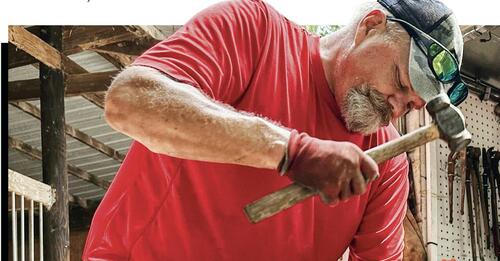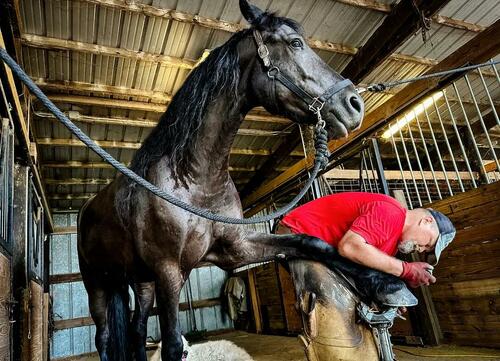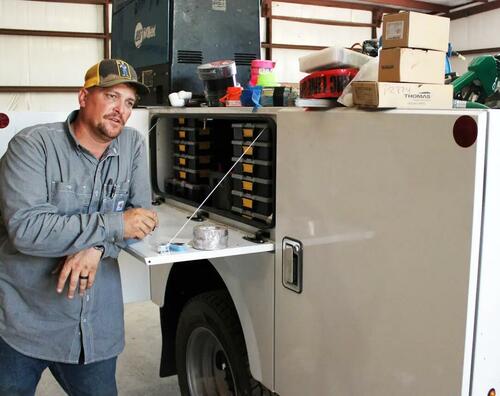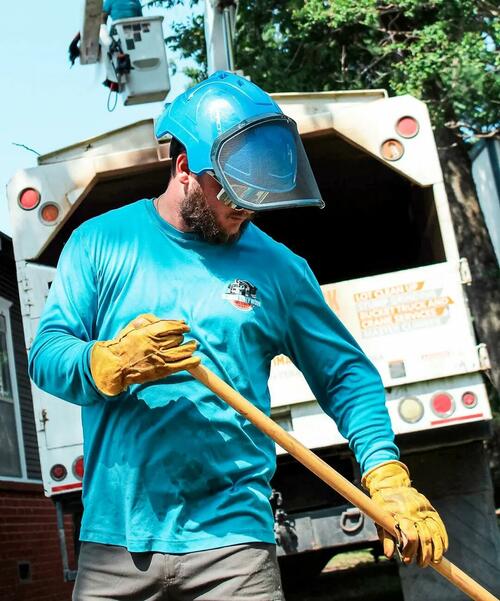
Work defines us. It shapes our days, fills our hours, gives meaning to what we do and who we are.
For some, it’s a profession, a career, a calling. Others see a job as a necessity that allows them to do their most important work: raising a family, building a community, pitching in to help others.
This is the work that has built America. This Labor Day weekend, we pause to praise the American worker.
‘There Ain’t No Quit in Me’
Farrier Robb Hoffman thinks a lot about the state of America as he drives between commercial horse operations and backyard hobby farms throughout North Florida.
His “office” is a small, white pickup with a mobile workshop in the bed, filled with tools for trimming horses’ hooves and shaping horseshoes.
For job security and because he has five grandchildren, he hopes the next president will bring about “a good, strong economy and a strong border,” he told The Epoch Times. “That’s more conducive to business.”
Without those things, “the people start to suffer and they start to cut the fat. They start to do away with things they don’t need, like horses.”
Hoffman, 59, hopes the upcoming election will put someone in the White House who is “for the people, and for our country. They’re Americans first, and they’re politicians second.”
“I can tell you straight up, there’s been many a day that my wife and I have ate less, so our kids can eat more. And I think all families go through that.”
Horses’ hooves continuously grow and need to be trimmed and balanced about every 4-6 weeks. Some need shoes that must be customized for each hoof. Some need corrective or therapeutic shoeing in order to move freely and without pain.

Hoffman went to farrier school out West to become certified in his craft. Then he apprenticed with pros near Ocala, Florida, said to be the horse capital of the world.
To make ends meet, he often works 12- to 16-hour days, sometimes six days a week. It’s the kind of bent-over work that makes a guy’s back, legs, and arms ache.
Between each horse, he rests a bit and takes a few sips of water he keeps in his truck.
“If you don’t like hard work, and working when it’s 105 degrees, or working when it’s pouring down rain and all your tools are getting wet, it’s just not a career somebody would want to pursue.”
So why do it?
It’s simple, he told The Epoch Times.
“I love horses, and I love people.
“Plus, my dad instilled in me a work ethic that, no matter what, you don’t give up.
“He used to tell me all the time, that there’s nothing more important in your life than your job … you always provide for your family. You feed your kids, you clothe your kids, and you take care of your kids and your wife.”
Hoffman has had “a lot of health issues and a lot of debilitating things”… “but I just don’t quit. There ain’t no quit in me.”
He works wearing therapeutic shoes and leg braces.
“I just don’t look at it like a disability. I just look at it like, this is the cross that I bear, and I’m gonna do everything I can to do everything that I do well.
And he doesn’t see his work as just providing foot care for horses.
“I’ve tried to use this as a ministry. Sometimes that has to deal with Christianity, and sometimes people just need to talk, to get things off their chest, like therapy.”
One client calls him a “farr-apist.” It’s a moniker he’d like to put on a hat some day.
The Value of Work
Darryl Burkett doesn’t fit the stereotype of a CEO. With his ball cap cocked back on his head, he contemplates the grease under his nails, takes a break from restocking his truck with plumbing supplies, and opines about why he’s proud of his work in Durant, Oklahoma.
Since 2009, he’s owned and operated KD Plumbing & Construction, LLC., a business that has grown to employ 14 people in a warehouse near the airport. He figures the keys to his entrepreneurial success are his dedication to his family and his community and an education that extends beyond classrooms and lectures. His most skilled instructor, he says, was his father.

“My dad told me that if you learn how to do everything and you’re willing to do anything, you’ll always make a living. You make yourself valuable,” he told The Epoch Times.
Like most ranchers, tradesmen, and blue collar workers in this Southeast Oklahoma town, Burkett has amassed a variety of skills. He welds, fixes equipment, repairs plumbing, builds things, and operates all kinds of vehicles.
“There’s nothing that I’m scared to do.”
He played some baseball in college, then went to work at the Choctaw Casino & Resort-Durant. But realizing he “was not an inside guy,” he moved on to work with his father, who taught him valuable technical skills.
But more importantly, he said, his father taught him the value of work.
Eventually, he bought a truck, gathered his tools, and opened his own business. But it’s the work ethic, taught by his father, that has kept his company open and his family fed, he said.
“I like to work with my hands. I’ll get down in the hole like anyone else. If I have to keep my crew late, I’m right there with them.”
He likes knowing that others, far beyond his immediate family, depend on the jobs he provides. Few think about the workers who tend a city’s infrastructure ... until the water stops.
“If [tradesmen] quit for a week, the country would fall apart,” he said.
Burkett wants his children to feel the same pride and satisfaction in their work, regardless of the career they choose. He’s less concerned about the kind of work they do and more focused on the type of workers they become.
“I want to teach them well enough to be my competitors someday.”
Blue Collar Skills Pay
Blue collar workers deserve the same respect as other professionals, some told The Epoch Times.
Nine years ago, Kevin Dougherty was a cybersecurity specialist with a company in Houston, Texas. Today, he prefers to wield a chainsaw from an elevated bucket mounted to a truck as part of a three-man tree-trimming crew in Bryan County, Oklahoma.

“I’m tired of working in an office,” said Dougherty, 39, foreman of Texoma Dirty Work Tree Service. “As much as I can, I like to get in the bucket.”
Along with co-workers DJ Henson and Billy Derryberry, he trims limbs away from roofs and electrical lines and removes trees that could fall on buildings or other property.
His coworker, Henson, left the loan department of a local bank about a year ago to trim trees. All three men in the crew agree: They find fulfillment and enjoyment in providing an essential service that protects their customers’ property.
“[Without us] trees would fall on houses,” Henson said.
Plus, running chainsaws and wood chippers pays better than shuffling papers and typing on computer keyboards, they said.
Henson spends about 55 hours a week raking tree debris and hauling away the limbs Dougherty drops to the ground from more than 20 feet above. Then he feeds them into a chipper.
“It’s harder work“ than at the bank, Henson said, ”but I make a lot more money.”
Dougherty said most of his coworkers were raised in politically and socially conservative homes. Most still lean that way, he said, and they base political preferences largely on policies affecting their work.
When it comes to who will inhabit the White House next, he said, issues such as the Keystone pipeline make the best barometers of blue collar sympathies.
“When they shut that down, a lot of blue collar guys started reaching [out to be] Republican. They’re deciding on [voting for] whoever will keep them at work.”
He believes salaries for blue collar vocations are rising because fewer people are willing to do physically demanding work. And despite what some may think, education matters, even in blue collar work. The more skills you master, the more you can earn, he said.
“You can make six figures easy.”
But, some things matter more than money.
“I get out here and do it because I love it,” he said. “People don’t realize that blue collar jobs are honorable.”
Every Shift Brings an Opportunity
Gina Rivera, 27, is filling shifts this Labor Day weekend as a server at a restaurant where patrons will be celebrating the holiday that honors workers.
She’s fine with that.
In fact, it’s an opportunity. Not only will the single mother earn some side-hustle cash, but she'll also be able to market herself.
Rivera, of Lakeland, Florida, holds three jobs. She’s a licensed cosmetologist and a real estate agent, too. For her, each job blends into the others.

“I like networking. I like meeting new people, talking with people,” she told The Epoch Times.
Every diner, salon client, and prospective home buyer is a potential customer at one of her other businesses.
Those are Rivera’s jobs.
Her “work” is caring for her three children. At 7, her oldest, Malachi, is just starting second grade. Her middle child, Luca, is 4, and the youngest, Rosemar, is just 3 three months old.
It’s constant motion, a work in progress.
“It’s hard,” the Massachusetts native said. “I had to push myself. There were times I wanted to give up.”
If not for her mother—a fellow cosmetologist, who encouraged her to pursue that licensing—and a friend who watches her children, Rivera couldn’t support her family.
“It takes a village,” she said. “A lot of women don’t have a village.”
Read the rest here...
Work defines us. It shapes our days, fills our hours, gives meaning to what we do and who we are.
For some, it’s a profession, a career, a calling. Others see a job as a necessity that allows them to do their most important work: raising a family, building a community, pitching in to help others.
This is the work that has built America. This Labor Day weekend, we pause to praise the American worker.
‘There Ain’t No Quit in Me’
Farrier Robb Hoffman thinks a lot about the state of America as he drives between commercial horse operations and backyard hobby farms throughout North Florida.
His “office” is a small, white pickup with a mobile workshop in the bed, filled with tools for trimming horses’ hooves and shaping horseshoes.
For job security and because he has five grandchildren, he hopes the next president will bring about “a good, strong economy and a strong border,” he told The Epoch Times. “That’s more conducive to business.”
Without those things, “the people start to suffer and they start to cut the fat. They start to do away with things they don’t need, like horses.”
Hoffman, 59, hopes the upcoming election will put someone in the White House who is “for the people, and for our country. They’re Americans first, and they’re politicians second.”
“I can tell you straight up, there’s been many a day that my wife and I have ate less, so our kids can eat more. And I think all families go through that.”
Horses’ hooves continuously grow and need to be trimmed and balanced about every 4-6 weeks. Some need shoes that must be customized for each hoof. Some need corrective or therapeutic shoeing in order to move freely and without pain.

Hoffman went to farrier school out West to become certified in his craft. Then he apprenticed with pros near Ocala, Florida, said to be the horse capital of the world.
To make ends meet, he often works 12- to 16-hour days, sometimes six days a week. It’s the kind of bent-over work that makes a guy’s back, legs, and arms ache.
Between each horse, he rests a bit and takes a few sips of water he keeps in his truck.
“If you don’t like hard work, and working when it’s 105 degrees, or working when it’s pouring down rain and all your tools are getting wet, it’s just not a career somebody would want to pursue.”
So why do it?
It’s simple, he told The Epoch Times.
“I love horses, and I love people.
“Plus, my dad instilled in me a work ethic that, no matter what, you don’t give up.
“He used to tell me all the time, that there’s nothing more important in your life than your job … you always provide for your family. You feed your kids, you clothe your kids, and you take care of your kids and your wife.”
Hoffman has had “a lot of health issues and a lot of debilitating things”… “but I just don’t quit. There ain’t no quit in me.”
He works wearing therapeutic shoes and leg braces.
“I just don’t look at it like a disability. I just look at it like, this is the cross that I bear, and I’m gonna do everything I can to do everything that I do well.
And he doesn’t see his work as just providing foot care for horses.
“I’ve tried to use this as a ministry. Sometimes that has to deal with Christianity, and sometimes people just need to talk, to get things off their chest, like therapy.”
One client calls him a “farr-apist.” It’s a moniker he’d like to put on a hat some day.
The Value of Work
Darryl Burkett doesn’t fit the stereotype of a CEO. With his ball cap cocked back on his head, he contemplates the grease under his nails, takes a break from restocking his truck with plumbing supplies, and opines about why he’s proud of his work in Durant, Oklahoma.
Since 2009, he’s owned and operated KD Plumbing & Construction, LLC., a business that has grown to employ 14 people in a warehouse near the airport. He figures the keys to his entrepreneurial success are his dedication to his family and his community and an education that extends beyond classrooms and lectures. His most skilled instructor, he says, was his father.

“My dad told me that if you learn how to do everything and you’re willing to do anything, you’ll always make a living. You make yourself valuable,” he told The Epoch Times.
Like most ranchers, tradesmen, and blue collar workers in this Southeast Oklahoma town, Burkett has amassed a variety of skills. He welds, fixes equipment, repairs plumbing, builds things, and operates all kinds of vehicles.
“There’s nothing that I’m scared to do.”
He played some baseball in college, then went to work at the Choctaw Casino & Resort-Durant. But realizing he “was not an inside guy,” he moved on to work with his father, who taught him valuable technical skills.
But more importantly, he said, his father taught him the value of work.
Eventually, he bought a truck, gathered his tools, and opened his own business. But it’s the work ethic, taught by his father, that has kept his company open and his family fed, he said.
“I like to work with my hands. I’ll get down in the hole like anyone else. If I have to keep my crew late, I’m right there with them.”
He likes knowing that others, far beyond his immediate family, depend on the jobs he provides. Few think about the workers who tend a city’s infrastructure … until the water stops.
“If [tradesmen] quit for a week, the country would fall apart,” he said.
Burkett wants his children to feel the same pride and satisfaction in their work, regardless of the career they choose. He’s less concerned about the kind of work they do and more focused on the type of workers they become.
“I want to teach them well enough to be my competitors someday.”
Blue Collar Skills Pay
Blue collar workers deserve the same respect as other professionals, some told The Epoch Times.
Nine years ago, Kevin Dougherty was a cybersecurity specialist with a company in Houston, Texas. Today, he prefers to wield a chainsaw from an elevated bucket mounted to a truck as part of a three-man tree-trimming crew in Bryan County, Oklahoma.

“I’m tired of working in an office,” said Dougherty, 39, foreman of Texoma Dirty Work Tree Service. “As much as I can, I like to get in the bucket.”
Along with co-workers DJ Henson and Billy Derryberry, he trims limbs away from roofs and electrical lines and removes trees that could fall on buildings or other property.
His coworker, Henson, left the loan department of a local bank about a year ago to trim trees. All three men in the crew agree: They find fulfillment and enjoyment in providing an essential service that protects their customers’ property.
“[Without us] trees would fall on houses,” Henson said.
Plus, running chainsaws and wood chippers pays better than shuffling papers and typing on computer keyboards, they said.
Henson spends about 55 hours a week raking tree debris and hauling away the limbs Dougherty drops to the ground from more than 20 feet above. Then he feeds them into a chipper.
“It’s harder work“ than at the bank, Henson said, ”but I make a lot more money.”
Dougherty said most of his coworkers were raised in politically and socially conservative homes. Most still lean that way, he said, and they base political preferences largely on policies affecting their work.
When it comes to who will inhabit the White House next, he said, issues such as the Keystone pipeline make the best barometers of blue collar sympathies.
“When they shut that down, a lot of blue collar guys started reaching [out to be] Republican. They’re deciding on [voting for] whoever will keep them at work.”
He believes salaries for blue collar vocations are rising because fewer people are willing to do physically demanding work. And despite what some may think, education matters, even in blue collar work. The more skills you master, the more you can earn, he said.
“You can make six figures easy.”
But, some things matter more than money.
“I get out here and do it because I love it,” he said. “People don’t realize that blue collar jobs are honorable.”
Every Shift Brings an Opportunity
Gina Rivera, 27, is filling shifts this Labor Day weekend as a server at a restaurant where patrons will be celebrating the holiday that honors workers.
She’s fine with that.
In fact, it’s an opportunity. Not only will the single mother earn some side-hustle cash, but she’ll also be able to market herself.
Rivera, of Lakeland, Florida, holds three jobs. She’s a licensed cosmetologist and a real estate agent, too. For her, each job blends into the others.

“I like networking. I like meeting new people, talking with people,” she told The Epoch Times.
Every diner, salon client, and prospective home buyer is a potential customer at one of her other businesses.
Those are Rivera’s jobs.
Her “work” is caring for her three children. At 7, her oldest, Malachi, is just starting second grade. Her middle child, Luca, is 4, and the youngest, Rosemar, is just 3 three months old.
It’s constant motion, a work in progress.
“It’s hard,” the Massachusetts native said. “I had to push myself. There were times I wanted to give up.”
If not for her mother—a fellow cosmetologist, who encouraged her to pursue that licensing—and a friend who watches her children, Rivera couldn’t support her family.
“It takes a village,” she said. “A lot of women don’t have a village.”
Read the rest here…
Loading…






